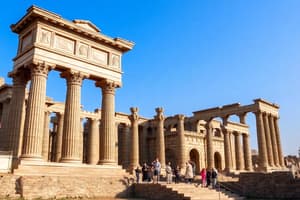Podcast
Questions and Answers
What is the main aim of studying history?
What is the main aim of studying history?
- To validate modern technologies
- To preserve artifacts
- To understand human behavior and societal changes (correct)
- To promote political agendas
Which of the following periods in history is characterized by the rise of empires and advances in philosophy?
Which of the following periods in history is characterized by the rise of empires and advances in philosophy?
- Classical Antiquity (correct)
- Modern History
- Middle Ages
- Ancient History
What does the term 'chronology' refer to in the context of history?
What does the term 'chronology' refer to in the context of history?
- Analysis of primary documents
- Study of archaeological findings
- Comparison of cultural artifacts
- Sequence of events in time (correct)
What role does history play in understanding current events?
What role does history play in understanding current events?
Which method of historical research involves gathering narratives from individuals?
Which method of historical research involves gathering narratives from individuals?
Who is often referred to as the 'Father of History'?
Who is often referred to as the 'Father of History'?
What is a significant challenge in the study of history?
What is a significant challenge in the study of history?
Which historical period is known for the cultural revival in Europe and focus on humanism?
Which historical period is known for the cultural revival in Europe and focus on humanism?
Flashcards are hidden until you start studying
Study Notes
Definition of History
- Study of past events.
- Involves analysis of records, artifacts, and testimonies.
- Aims to understand human behavior and societal changes over time.
Importance of History
- Provides context for current events and issues.
- Teaches lessons from past successes and failures.
- Helps to build a sense of identity and culture.
Major Periods in History
-
Prehistory
- Time before written records.
- Focus on archaeology and anthropology.
-
Ancient History
- Includes early civilizations (e.g., Mesopotamia, Egypt, Indus Valley).
- Development of writing, agriculture, and trade.
-
Classical Antiquity
- Rise of empires (e.g., Greece, Rome).
- Advances in philosophy, art, and governance.
-
Middle Ages
- Feudal systems and the spread of religions (e.g., Christianity, Islam).
- Development of kingdoms and the impact of the Black Death.
-
Renaissance and Reformation
- Cultural revival in Europe, focus on humanism.
- Religious reform movements leading to Protestantism.
-
Modern History
- Age of Enlightenment, revolutions (American, French).
- Industrial Revolution and its social impacts.
-
Contemporary History
- Post-World War developments (Cold War, globalization).
- Technological advancements and their effects on society.
Key Concepts in History
- Chronology: Sequence of events in time.
- Cause and Effect: Understanding why events occurred and their consequences.
- Historical Interpretation: Different perspectives and biases in analyzing events.
- Primary and Secondary Sources: Types of evidence used to study history.
Methods of Historical Research
- Archival Research: Study of primary documents and records.
- Oral History: Gathering narratives from individuals about past experiences.
- Comparative History: Analyzing differences and similarities across cultures and time periods.
Notable Historians
- Herodotus: Often called the "Father of History" for his work on the Greco-Persian Wars.
- Thucydides: Focused on political and military history in his account of the Peloponnesian War.
- Leopold von Ranke: Emphasized empirical research and the importance of primary sources.
Challenges in History
- Bias and Subjectivity: Recognizing the influence of the historian's perspective.
- Incomplete Records: Gaps in historical documentation can lead to misunderstandings.
- Interpretative Differences: Variability in how events are viewed by different cultures or periods.
Conclusion
- History is a dynamic field that shapes our understanding of human nature and society.
- Ongoing research and discoveries continue to evolve historical narratives.
Definition of History
- Involves the systematic study of past events, contexts, and their impacts on human behavior.
- Utilizes records, artifacts, and personal testimonies for comprehensive analysis.
- Aims to provide insights into societal changes and cultural evolution over time.
Importance of History
- Contextualizes current events, enhancing understanding of contemporary issues.
- Offers lessons learned from historical successes, failures, and pivotal moments.
- Contributes to the formation of individual and collective identity and cultural heritage.
Major Periods in History
- Prehistory: Encompasses the era before written language; primarily studied through archaeology and anthropology.
- Ancient History: Characterized by the emergence of early civilizations such as Mesopotamia, Egypt, and the Indus Valley; notable for advancements in trade and agriculture.
- Classical Antiquity: Marked by the growth of significant empires like Greece and Rome; characterized by cultural advancements in philosophy, art, and governance.
- Middle Ages: Defined by feudal systems, the dissemination of major religions (Christianity, Islam), and socio-political changes influenced by events like the Black Death.
- Renaissance and Reformation: Cultivated a cultural revival in Europe, emphasizing humanism and sparking religious reform that led to the rise of Protestantism.
- Modern History: Featured the Age of Enlightenment, transformative revolutions (American and French), and significant societal changes stemming from the Industrial Revolution.
- Contemporary History: Focuses on developments following World War II, including the Cold War's influences and the impact of globalization and technological advancements.
Key Concepts in History
- Chronology: Establishes the order and sequence of events, enhancing understanding of historical flow.
- Cause and Effect: Explores the reasons behind historical events and their resulting consequences.
- Historical Interpretation: Acknowledges various perspectives and biases that affect the analysis of historical narratives.
- Primary and Secondary Sources: Differentiates between original documents and accounts (primary) and interpretations or analyses (secondary) used in research.
Methods of Historical Research
- Archival Research: Involves in-depth examination of primary documents and historical records to gather firsthand accounts.
- Oral History: Collects personal recollections and narratives from individuals about their historical experiences and events.
- Comparative History: Evaluates similarities and differences across diverse cultures and epochs to draw meaningful conclusions.
Notable Historians
- Herodotus: Regarded as the "Father of History," known for documenting the Greco-Persian Wars and establishing a narrative style in history writing.
- Thucydides: Analyzed the political and military dimensions of history, particularly in his account of the Peloponnesian War, emphasizing factual accuracy.
- Leopold von Ranke: Advocated for rigorous empirical research and the critical importance of primary sources in historical investigation.
Challenges in History
- Bias and Subjectivity: Recognizes the challenges posed by the historian's personal viewpoints, affecting objectivity in historical accounts.
- Incomplete Records: Emphasizes the difficulties arising from gaps in historical documentation, which can misinterpret events or eras.
- Interpretative Differences: Highlights variability in historical understanding across different cultures and time periods, leading to diverse narratives.
Conclusion
- History is an evolving discipline that deepens our comprehension of human behavior and societal structure.
- Ongoing research and discoveries are continually reshaping historical narratives and enriching our understanding of the past.
Studying That Suits You
Use AI to generate personalized quizzes and flashcards to suit your learning preferences.




